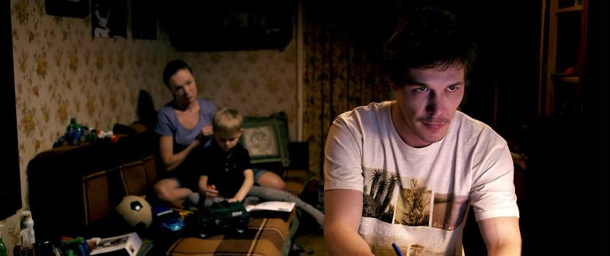
The Barbican is delighted to present New East Cinema, a new bi-monthly film series accompanied by ScreenTalks, which begin in April 2016. The series is a collaboration between the Barbican and Calvert 22 Foundation, and is curated by The New Social, a cultural collective bringing contemporary cinema from Eastern Europe and beyond to London. It looks across the wide expanse of land that stretches from Eastern Europe, the Baltic countries and the Balkans, through to Russia and Central Asia to uncover the most thought-provoking, daring and vibrant cinema coming from today’s ‘New East’. The series begins with a screening of Yury Bykov’s hard-hitting portrait of contemporary Russia, The Fool (Durak).
Director/writer: Yury Bykov
Cast: Artem Bystrov, Natalia Surkova, Yury Tsurilo, Boris Nevzorov
Russia Drama 116mins
As recently suggested by Andrei Zvyagintsev’s barnstormingly brilliant LEVIATHAN, contemporary artistic renditions of Russia and its current socio-political landscape are perhaps all the better for being so ludicrously overblown. Yury Bykov’s DURAK (THE FOOL) is another hysterical snapshot of a decrepit state, as allegorised by a nine-story apartment block that’s on the verge of wholesale collapse due to four decades of administrative neglect. Dedicated to Alexei Balabanov, who died during last year’s Cannes Film Festival (where Bykov’s second feature THE MAJOR was competing in Critic’s Week), DURAK received much applause from a capacity audience this week at Locarno Film Festival, where it received its international premiere.
Humble plumber Dima Nikitin (Artem Bystrov) lives with his parents, wife and son in a cramped apartment. When he is called one evening to another block of flats in a district across town, his otherwise routine inspection of a burst pipe reveals an ominously sized crack in an interior bearing wall. Rushing to check the exterior, he notices two fissures going up the side of the dilapidated dwelling, and, after some quick bedtime arithmetic, reckons that due to its height and the degree to which it is tilting, the building is likely to fall down at any moment. Though the night’s late for ordinary folk, it’s very young for the town’s top brass, who are midway through celebrating the housing chief’s 50th birthday when Dima shows up to warn them of the impending disaster.
Bykov’s fanciful tale, of a lowly repairman taking on the local authorities on behalf of a community of disenfranchised drunks and their long-suffering wives, begins in a grippingly hyperreal fashion, making no qualms about the devastated and devastating domestic plight of the disparate working community at its centre. The long, choreographed take with which the film begins—in which an alcoholic’s daily rant to his wife and daughter escalates into horrible violence—lends a believable brutality that’s only magnified by the defeat with which the wife, tending to her bruised and swollen mouth, decides not to file charges on account that her husband needs to attend work the next day in order to secure a monthly bonus.
On the bottom rungs, volatility is never too far away. Even Dima’s situ is far from harmonious, as evinced by an amusingly claustrophobic dinner scene that boils over when his worrisome mother picks one trivial quibble with her husband too many. Though she’s quick to call Dima’s dad a fool, it’s her son who emerges as the film’s eponymous would-be hero, an honest working man who dares to address the insurmountable undertaking of saving and bettering the lives of those belonging to his own hapless class—a mission undone by communal indifference as well as in-fighting at the top.
In Russia, perhaps, absurdity is the only truth. Though on a storytelling level very little of this remains plausible, Dima’s Sisyphean task is cued by a smaller, perhaps forced metaphor early on, in which he and his dad repeatedly mend a broken bench outside their building. DURAK’s hyperrealism proves unsustainable, bleeding in the course of its proceedings into a routine symbolism. In some ways, things unfold like a more cynical update of HIGH NOON (1951)—in which Gary Cooper tried in vain to rally a town together against oncoming villains. Elsewhere, the gangsterism eventually displayed by the politicians is anticipated when Dima, perhaps channelling Robert De Niro in THE GODFATHER PART II (1974), assures two fellow plumbers that he’ll talk with the bigwigs tomorrow…
Though Dima is far from a card-carrying communist, we’re clearly meant to interpret the class consciousness he shows vague signs of as a doomed affair: if he’s not shot by the local government, he might just be beaten to death by those he’s trying to save. Such portrayals are not unproblematic, of course, but neither are they wholly inaccurate: organising any oppressed group of people in a struggle against their own circumstances is often a complicated matter. Still, Bykov’s depiction of a stunted, squalor-ridden community too frequently lacks compassion: indeed, like its self-preserving politicians, the film itself shuns these people to the margins for large amounts of its time—and having them all take a frantic, crazy-sounding Dima on his word might be one narrative convenience too far. MICHAEL PATTISON
THE FOOL WON BEST ACTOR AT LOCARNO FILM FESTIVAL 2014
Barbican Cinema, Barbican Centre
The New Social presents New East Cinema:
The Fool (Durak) + ScreenTalk
Wed 27 April 6:30pm, Cinema 2
barbican.org.uk/film
Box Office 0845 120 7527